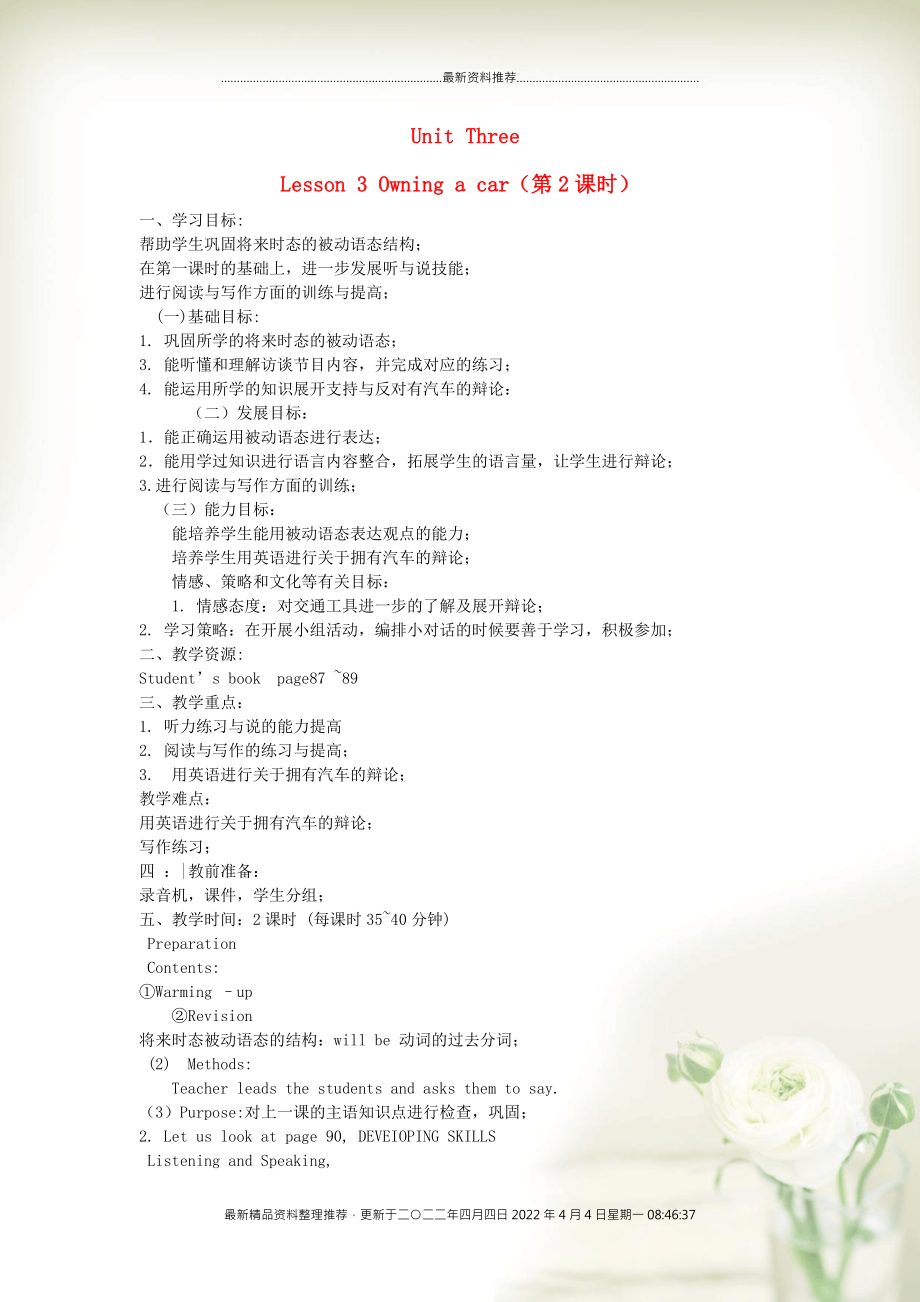《【金識(shí)源】九年級(jí)英語(yǔ)上冊(cè) Unit 3 Lesson 3 Owning a car(第二課時(shí))教學(xué)設(shè)計(jì) 上海新世紀(jì)版》由會(huì)員分享��,可在線閱讀,更多相關(guān)《【金識(shí)源】九年級(jí)英語(yǔ)上冊(cè) Unit 3 Lesson 3 Owning a car(第二課時(shí))教學(xué)設(shè)計(jì) 上海新世紀(jì)版(3頁(yè)珍藏版)》請(qǐng)?jiān)谘b配圖網(wǎng)上搜索��。
1、……………………………………………………………最新資料推薦…………………………………………………
Unit Three
Lesson 3 Owning a car(第2課時(shí))
一��、學(xué)習(xí)目標(biāo):
幫助學(xué)生鞏固將來(lái)時(shí)態(tài)的被動(dòng)語(yǔ)態(tài)結(jié)構(gòu)��;
在第一課時(shí)的基礎(chǔ)上��,進(jìn)一步發(fā)展聽(tīng)與說(shuō)技能��;
進(jìn)行閱讀與寫(xiě)作方面的訓(xùn)練與提高��;
(一)基礎(chǔ)目標(biāo):
1. 鞏固所學(xué)的將來(lái)時(shí)態(tài)的被動(dòng)語(yǔ)態(tài)��;
3. 能聽(tīng)懂和理解訪談節(jié)目?jī)?nèi)容��,并完成對(duì)應(yīng)的練習(xí)��;
4. 能運(yùn)用所學(xué)的知識(shí)展開(kāi)支持與反對(duì)有汽車(chē)的辯論:
?�。ǘ┌l(fā)展目標(biāo):
1.能正確運(yùn)用被動(dòng)語(yǔ)態(tài)進(jìn)行表達(dá)��;
2.能用學(xué)過(guò)知識(shí)進(jìn)行語(yǔ)言?xún)?nèi)容整合
2��、��,拓展學(xué)生的語(yǔ)言量��,讓學(xué)生進(jìn)行辯論;
3.進(jìn)行閱讀與寫(xiě)作方面的訓(xùn)練��;
?�。ㄈ┠芰δ繕?biāo):
能培養(yǎng)學(xué)生能用被動(dòng)語(yǔ)態(tài)表達(dá)觀點(diǎn)的能力��;
培養(yǎng)學(xué)生用英語(yǔ)進(jìn)行關(guān)于擁有汽車(chē)的辯論��;
情感��、策略和文化等有關(guān)目標(biāo):
1. 情感態(tài)度:對(duì)交通工具進(jìn)一步的了解及展開(kāi)辯論��;
2. 學(xué)習(xí)策略:在開(kāi)展小組活動(dòng)��,編排小對(duì)話(huà)的時(shí)候要善于學(xué)習(xí)��,積極參加��;
二��、教學(xué)資源:
Student’s book page87 ~89
三��、教學(xué)重點(diǎn):
1. 聽(tīng)力練習(xí)與說(shuō)的能力提高
2. 閱讀與寫(xiě)作的練習(xí)與提高��;
3. 用英語(yǔ)進(jìn)行關(guān)于擁有汽車(chē)的辯論;
教學(xué)難點(diǎn):
用英語(yǔ)進(jìn)行關(guān)于擁有汽車(chē)的辯論��;
3��、
寫(xiě)作練習(xí)��;
四 :|教前準(zhǔn)備:
錄音機(jī)��,課件��,學(xué)生分組��;
五��、教學(xué)時(shí)間:2課時(shí) (每課時(shí)35~40分鐘)
Preparation
Contents:
①Warming –up
?�、赗evision
將來(lái)時(shí)態(tài)被動(dòng)語(yǔ)態(tài)的結(jié)構(gòu):will be 動(dòng)詞的過(guò)去分詞��;
(2) Methods:
Teacher leads the students and asks them to say.
(3)Purpose:對(duì)上一課的主語(yǔ)知識(shí)點(diǎn)進(jìn)行檢查��,鞏固��;
2. Let us look at page 90, DEVEIOPING SKILLS
Listening
4��、 and Speaking,
The TV programme .Let’s talk continues. Listen and complete the three tasks.
Task 1: Complete the following table.
Task 2: Listen to the last part of the talk show and complete the following answers to the questions you hear.
Task 3: According to Mr. Fang, why will most citizens b
5��、e able to afford a private car?
The teacher plays the record two times, and the students should listen carefully, and at the second time, complete the questions
3. A debate on the topic: Should one own a car?
Step 1 Form groups of four, discuss the reasons for owning a car, and the reasons agai
6��、nst it, and then complete the table.
Step 2. Divide your into two groups and begin the debate.
For this part, we divide the class into two groups, and one is for, and the other is against; then they can begin:
For example:
For: I’m in favor a car because owning a car has many advantages.
Again
7��、st: But don’t you think traffic jams will be caused if there are too many cars on the roads?
…
When the students are debating on the topic, the teacher can sit and listen to them, and remember the major opinions on for and against.
Reading:
Read the following passage and complete the two tasks b
8��、elow.
For this part, the teacher asks the students to read the passage carefully, at least two times, and them asks them try to complete the Task 1 and Task 2.
When the students finished doing the questions, ask several students to say his or her answers to the class. Finally, check the right answ
9��、ers.
The right answers are:
Task 1: 1. Paragraph 3
2. Paragraph 2
3. Paragraph 1
Task 2:
1. on foot, by horse, by boat;
2. have a much faster means of transport, get to work, go on holiday;
3. in Germany in 1885.
4. sped up, low prices, many more Americans, even f
10��、armers and factory workers;
5.pace, cost;
Now, let’s do the Task 3, this part is about some phrases and we learned in this lesson.
The answers are :
a 2. b 3. c 4. c 5. c
Writing:
In 60 to 70 words, write about your own opinion about the topic: Should a family have a car?
六��、板書(shū)設(shè)計(jì):
Le
11��、sson 3 Owning a car
將來(lái)時(shí)態(tài)被動(dòng)語(yǔ)態(tài)的結(jié)構(gòu):will+ be +動(dòng)詞的過(guò)去分詞��;
1. on foot, by horse, by boat;
2. have a much faster means of transport, get to work, go on holiday;
3. in Germany in 1885.
4. sped up, low prices, many more Americans, even farmers and factory workers;
5.pace, cost;
七��、
Homework:
Writing:
In 60 to 70 words, write about your own opinion about the topic: Should a family have a car?
八��、教學(xué)反思:
通過(guò)分組辯論的形式��,調(diào)動(dòng)同學(xué)們說(shuō)英語(yǔ)的積極性��,但個(gè)別同學(xué)需要向別人學(xué)習(xí)��,如何更加積極地投入到英語(yǔ)學(xué)習(xí)中.
最新精品資料整理推薦,更新于二〇二二年四月四日2022年4月4日星期一08:46:37
 【金識(shí)源】九年級(jí)英語(yǔ)上冊(cè) Unit 3 Lesson 3 Owning a car(第二課時(shí))教學(xué)設(shè)計(jì) 上海新世紀(jì)版
【金識(shí)源】九年級(jí)英語(yǔ)上冊(cè) Unit 3 Lesson 3 Owning a car(第二課時(shí))教學(xué)設(shè)計(jì) 上海新世紀(jì)版

